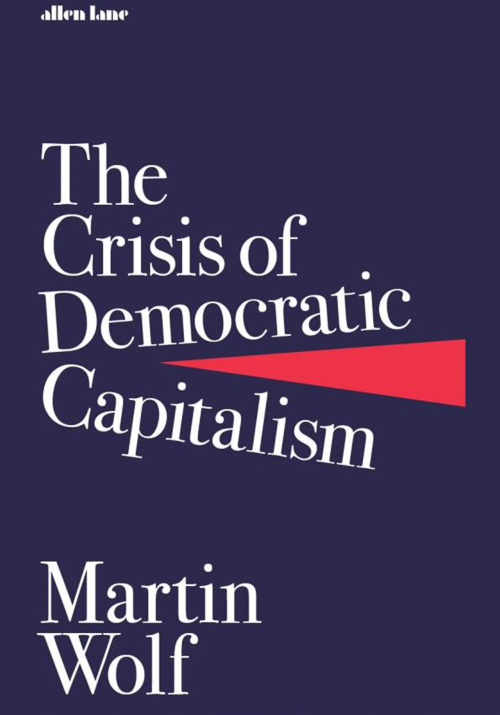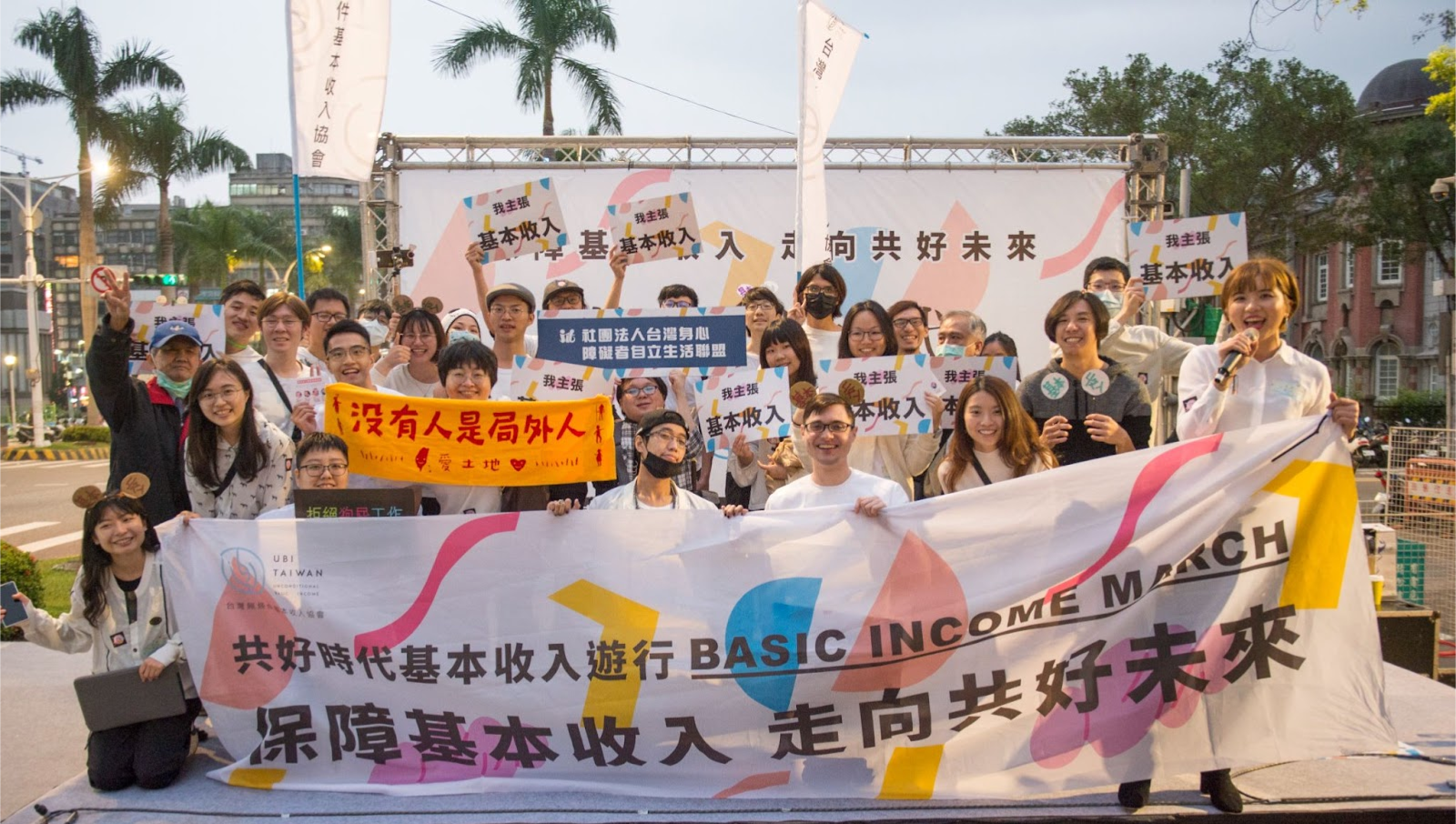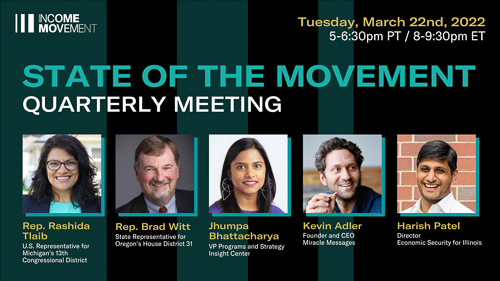
by Peter Knight | Feb 10, 2023 | News
Martin Wolf of the Financial Times has a new book, The Crisis of Democratic Capitalism, in which he dismisses UBI very superficially.
Geoff Crocker has posted a review in which he argues that Wolf’s “summary dismissal of proposals such as basic income, which he calls a ‘delusion’ (p278)” lacks depth. Crocker writes: “Stating that a UK basic income of £11,200 per adult would cost £580 billion or about 25% of GDP, and is therefore unaffordable and that ‘that is all there is to say about this idea’ (p283) is superficial and trivial. He equally dismisses his colleague Martin Sandbu’s more refined proposal. In static analysis, writers like Malcolm Torry and Stewart Lansley have shown that basic income schemes can be revenue neutral and achieve progressive redistribution. The further dynamic case that automation reduces labour income per unit of output, requiring increased non-labour income is equally ignored. Recent macroeconomic modelling by Cambridge Econometrics has demonstrated the stability of a basic income proposal funded by debt-free sovereign money.”
Read the full review here.

by Tyler Prochazka | Jan 17, 2023 | Featured
Taiwan is making history by sending out a one-time universal cash payment of $6,000 New Taiwan dollars (NTD) to every citizen “young and old.” This is the first time the country has implemented such a policy, and it comes as a result of excess tax revenue of $450 billion NTD, much of which is coming from corporate taxes that have seen record-high profits. $140 billion NTD will be dedicated to the cash payments, with the remainder going towards improving labor and health insurance systems and providing funding for local governments.
UBI Taiwan hailed the move as a victory for Taiwanese citizens, as the payment is unconditional and universal, meaning that everyone in the country will receive it, regardless of income or other circumstances. They said it reflects the growing demand that a greater proportion of Taiwan’s growth is shared with average families.
“This is a huge victory for the basic income movement,” UBI Taiwan founder Tyler Prochazka said.
UBI Taiwan promotes unconditional basic income (UBI) in Taiwan. UBI is a policy that periodically sends out unconditional cash payments to every citizen in a country regardless of an individual’s income or job status.
The organization has noted the problem of stagnant wages for the last two decades in the country and the rising cost of housing. Through basic income payments, they argue that many Taiwanese could pursue better opportunities and improve their education.
“Unconditional cash transfers are an efficient way to provide an ‘economic vaccination’ to make sure that everyone can face the future in a healthy and happy manner,” said Jiakuan Su, the new chairman of UBI Taiwan.
Over the last few years, Taiwan’s economy has experienced record-breaking 6.45% GDP growth in 2021 and over 8.73% growth in exports in 2022. However, most people have not enjoyed the fruits of this economic growth, as a 104 Job Bank survey found that real wage growth was nearly zero in 2022 due to inflation. The universal cash payment is a way for everyone to have a small share in Taiwan’s economic success.
“With the rise of the pandemic over the last few years, Taiwan has experienced rapid changes in its economy and society,” Su said. “We have experienced directly why Taiwan needs a resilient social welfare system to protect each person’s economic security.”
Since the payment is equal to all taxpayers, it will have a progressive effect with a greater proportion of the refund going to low-income earners. There is some expectation that the cash payment could help stimulate the economy because low-income households are more likely to use the money to satisfy their essentials, such as food and housing, freeing up some additional discretionary money for recreational uses as well. A greater willingness to spend by average families could help smaller businesses that may have struggled since the pandemic.
Both political parties have agreed on the general outline of the proposal and the cash could be sent out as soon as February. A surprise has been that the plan appears to be a universal rebate of the revenue instead of a targeted one, which will make it easier for everyone to apply and reduce administrative costs and time. One area still under consideration is whether foreign taxpayers will receive any of the money.
Previous cash assistance schemes during the pandemic were targeted and a stimulus voucher was sent universally. The pandemic vouchers were limited in how they could be spent and had an expiration date, similar to the vouchers under former President Ma Ying-Jeou.
Members of the Kuomintang (KMT) and Taiwan People’s Party (TPP) argued during the pandemic that cash should have been sent out instead of vouchers. At the time, the TPP held a news conference with UBI Taiwan to discuss the benefits of cash over vouchers. Many also complained that the targeted cash programs were difficult to receive because of the strict conditions.
Research by the World Bank later demonstrated that the simplicity of universal and unconditional cash payments during the pandemic increased access to the assistance and likely provided economic stimulus. Previous research showed a multiplier effect up to $2.6 for every dollar sent. Fears of saving the cash were largely overblown. For example, in over a dozen economies primarily in East Asia, 40 percent of the universal cash transfers during the pandemic were directly used for consumption.
Besides improved standard of living, research on basic income consistently shows improved mental health and trust in society. A meta-analysis of basic income policies looked at eight governmental reports as well as seven peer reviewed studies. They found there was justification that the alleviation of stress from financial instability could be a reason for improved mental health from basic income.
There have been criticisms of the current cash payment plan, including concerns about inflation. However, it is important to remember that this is surplus tax revenue that has already been collected and is not new money created by the central bank. An effect on inflation is just as likely if the government directly spends the money or if it is sent back to taxpayers.
Additionally, while it is true that Taiwan’s insurance systems require further reforms for sustainability, the vast majority of the surplus revenue is being used to shore up these systems and provide an emergency fund. A one time injection of funds is helpful but will not save these systems in the long run.
Previously, basic income advocates from UBI Taiwan have suggested that Taiwan could establish a sovereign wealth fund (SWF). Such a fund would act as a guarantee that Taiwanese could enjoy more equity in the growth of Taiwan’s economy even if wages remain stagnant. Excess revenue could be placed in the SWF and invested in the economy, with dividends from the SWF distributed back to the people each year, similar to the system in the US state of Alaska. The Alaska Permanent Fund sends out a yearly payment from the oil revenue generated in the state. In 2022, the universal payout reached a record high of $3,284 USD.
“I applaud the government’s decision to send the universal cash transfer and hope this establishes the precedent for Taiwan to consider making this a permanent policy,” Su said.
Prochazka furthered that by making this payment equal to all citizens, the government is taking the “first small step” towards ensuring that the benefits of economic growth are shared by all.

by Guest Contributor | Apr 9, 2022 | Opinion
14.5 million living in poverty
in the world’s fifth largest economy
until a global pandemic forced our chancellor
to spend £69 billion on a word
none of us had ever heard of.
Furlough showed universal basic income to be
a fundable possibility, at £67 billion net cost
paid for through reduced corporate tax breaks
and subsidies. Just 3.4 percent of GDP
to make absolute poverty extinct.
When the first unconditional money
hit mum’s bank account she cried
with eyes that could now see a future.
But trusting it took time. You’re not supposed to eat
normally just after a fast or you’ll be sick.
So we let relief drip into our days.
First in seconds, dancing round the kitchen
feeding shopping into starved cupboards
now bulging till their doors wouldn’t shut.
Then in minutes, a river that brought mum
home two full days a week. She began
helping me with my homework.
Grades went up. A well fed mind imagined
going to university, freed from the urgent need
to leave school early and start earning.
Knocks on the door brought not fear
but friends. Neighbours came to chat,
share ideas, our street hadn’t felt this alive
in years! Revitalised by breathing in
something other than stress and anxiety.
Minds to the right: tick
for smaller, simpler government; tick
for healthcare appointments reduced
8% by better physical and mental health; tick
for greater purchasing power from the ground up.
Minds to the left: tick
for greater community engagement; tick
for people secure enough to believe in a future; tick
for human ingenuity previously capped
by the poverty trap freed to help create
a society no longer chained to poor
wages for sourcing, making, selling poor
quality goods that return to poor
countries forced to burn, bury, breathe poor
quality air. Instead, the choice to say no
from a new sense of security, dignity, universality
we can do better.
Harula Ladd

by Peter Knight | Mar 29, 2022 | Events, News
This virtual event on 22 March 2022, organized by Income Movement, provided an opportunity to hear from legislators, experts, and thought leaders on the current state of the basic income movement in the United States.
Guest speakers discussed national, state, and local-level efforts, giving a bird’s-eye view of the movement and laying the foundation for Income Movement’s work fighting for direct cash in 2022.
Guest speakers include:
- Representative Rashida Tlaib: U.S. Representative for Michigan’s 13th Congressional District
- Representative Brad Witt: State Representative for Oregon’s House District 31
- Jhumpa Bhattacharya: VP of Programs and Strategy, Insight Center
- Kevin Adler: Founder and CEO, Miracle Messages
- Harish Patel: Director, Economic Security for Illinois
You can view the recording of the event, moderated by Income Movement’s founder, Stacey Rutland, by clicking here.
You can also view the individual segments below:

by Peter Knight | Mar 16, 2022 | Events, News
The University of Freiburg Institute for Basic Income Studies, together with the Berlin based think tank
polisphere are holding a digital conference on Wednesday 23.03.2022 chaired by Geoff Crocker,
author of ‘Basic Income and Sovereign Money‘ and editor of the web site www.ubi.org.
The focus of the conference is on economic development in East and South-East Asia, specifically on
three elements
Profiling current welfare systems
The constraint of debt/GDP ratios
The potential for basic income and debt-free sovereign money proposals
The conference is of specific interest to professional economists, including government economists,
academic economists, central bankers, politicians, economics journalists, aid agencies, and think tanks.
For the full program click here
Please register by clicking here.






